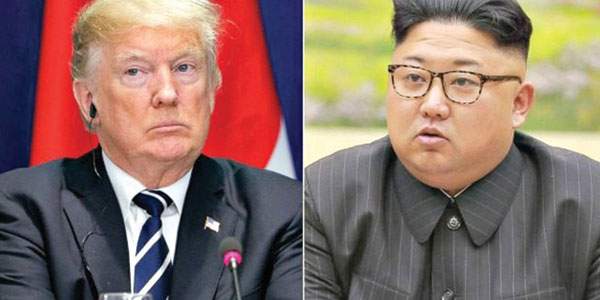
Commentary by Eulogio JP
Recently, President Trump and North Korean leader Kim Jong Un agreed to meet in June in Singapore. But North Korea is threatening to back out, thus damaging Trump’s hopes of a significant foreign policy success.
The first obstacle that North Korea placed on the path to a bilateral meeting was when the North Korean dictator claimed to oppose U.S.-South Korea military drills. The drills could lead to the meeting arrangements being scrapped, Kim threatened. Later, North Korea warned the United States that, if the Trump administration required the dismantling of its nuclear arsenal up front, then there was little point in talking.
“If they try to push us into … (a) corner and force only unilateral nuclear abandonment, we will no longer be interested in … (those) kind of talks and will have to reconsider whether we will accept the upcoming NK-U.S. summit,” Kim Kye Gwan, first vice minister of the Ministry of Foreign Affairs, stated via the Korea Central News Agency.
The odds of a summit taking place – or not ending abruptly if it does take place – drop considerably when one considers the leader on the other side of the equation: Donald Trump. The American president tends to get upset when events don’t go his way. Moreover, in April, Trump told reporters if the talks with North Korea weren’t going the right way he would “respectfully leave the meeting.”
If the bilateral meeting takes place, it’ll be a test of Trump’s ability to negotiate. The president needs to realize that political negotiations can’t be unilateral, especially between “enemies.” Both parties must compromise to reach an agreement.
If the summit takes place, I wonder if President Trump will be able to keep America and all its allies in mind when he’s negotiating. Or will he take an all-or-nothing approach – a strategy that’ll likely backfire, considering the other negotiator is an irrational dictator?
Adam Mount of the Federation of American Scientists, who specializes in studying North Korea, expressed a similar concern to mine in a recent story for CNN.
“The United States is faced with a critical choice: Will it pursue a deal with North Korea that improves U.S. and allied security, but falls short of immediate denuclearization? Or will it walk away with nothing?”
Chances are, America will walk away with nothing.
_______________________________________________________________________________________
¿Habrá una cumbre de EE. UU.-Corea del Norte?
Recientemente, el presidente Trump y el líder norcoreano Kim Jong Un acordaron reunirse en junio en Singapur. Pero Corea del Norte está amenazando con retirarse, lo que daña las esperanzas de Trump de lograr un éxito significativo en la política exterior.
El primer obstáculo que Corea del Norte puso en el camino hacia una reunión bilateral fue cuando el dictador norcoreano afirmó oponerse a los simulacros militares de EE. UU.-Corea del Sur. Los ejercicios podrían llevar a que se eliminen los arreglos de la reunión, amenazaron. Más tarde, Corea del Norte advirtió a los Estados Unidos que, si la administración Trump requería el desmantelamiento de su arsenal nuclear por adelantado, entonces no tenía mucho sentido hablar.
“Si tratan de empujarnos a … arrinconar y forzar sólo el abandono nuclear unilateral, ya no nos interesarán más las conversaciones y tendremos que reconsiderar si aceptaremos el próximo NK-U.S. cumbre “, declaró Kim Kye Gwan, primer viceministro del Ministerio de Asuntos Exteriores, a través de la Agencia Central de Noticias de Corea.
Las probabilidades de que no exista una cumbre, o si es que toma lugar que no termine abruptamente han disminuido considerablemente. Especialmente si se considera al líder del otro lado de la ecuación: Donald Trump. El Presidente estadounidense tiende a enojarse cuando los eventos no salen como él quiere. Además, en abril, Trump dijo a los periodistas que, si las conversaciones con Corea del Norte no iban bien, “respetuosamente abandonaría la reunión”.
Si se lleva a cabo la reunión bilateral, será una prueba de la capacidad de Trump para negociar. El Presidente debe darse cuenta de que las negociaciones políticas no pueden ser unilaterales, especialmente entre “enemigos”. Ambas partes deben comprometerse para llegar a un acuerdo.
Si la cumbre se lleva a cabo, me pregunto si el presidente Trump podrá tener en cuenta a Estados Unidos y a todos sus aliados cuando negocie. ¿O tomará un enfoque de todo o nada, una estrategia que probablemente sea contraproducente, teniendo en cuenta que el otro negociador es un dictador irracional?
Adam Mount, de la Federación de Científicos Estadounidenses, que se especializa en estudiar Corea del Norte, expresó una preocupación similar a la mía en una historia reciente para la CNN.
“Estados Unidos enfrenta una elección crítica: ¿buscará un acuerdo con Corea del Norte que mejore la seguridad de los EE. UU. Y de las fuerzas aliadas, pero no alcanzará la desnuclearización inmediata? ¿O se irá sin nada? “
Es probable que Estados Unidos se vaya sin nada.










